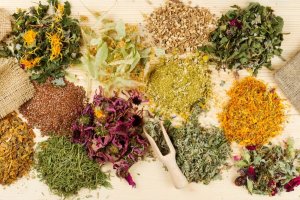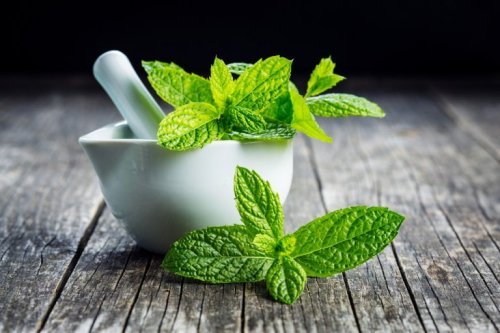Medicinal Herbs that Help Relieve Stomach Pain

Natural remedies have always been an alternative method for healing various ailments. The medicinal herbs that we’ll be talking about today will help relieve stomach pain quickly and effectively.
Stomach pain is uncomfortable, untimely and one of the most common ailments. It often occurs in the upper part of the stomach. Sometimes, it comes accompanied by gas, acidity, heavy digestion, vomiting or lack of appetite.
Today, we’ll tell you about several herbs and medicinal plants that will help you alleviate that pain. Their potent action can relieve heartburn, soothe pain and improve digestion. The best part is that they don’t have any side effects, and they’re very easy to get.
Fennel to Help Relieve Stomach Pain
Fennel seed helps with digestion, the expulsion of gases and prevents the pain caused by its accumulation.
- You can take it as an infusion to get fast relief.
- Additionally, you can take it raw, on top of a salad or add it to one of your dishes.
Chamomile
Chamomile is one of the gastric membrane’s greatest allies. It protects and repairs any damage thanks to its healing effects. It also helps relieve heartburn and gas, reduces acidity, gastritis and sore ulcers.
In addition, it’s an effective muscle relaxant and a natural anti-inflammatory agent, which will also help relieve stomach pain.
Discover: Relieve Constipation with this Plum, Fennel and Flax Seed Smoothie
Mint and Rue
Mint is a powerful digestive agent, but it’s also great for counteracting ulcers and gall bladder ailments.
You can purchase it in tea bags or make infusions using mint leaves.

Rue, on the other hand, calms gas, the feeling of acidity and other stomach issues. Plus, it can also help regulate menstruation.
Paico and Cedron
Paico is a powerful digestive stimulant. It helps relieve stomach discomfort, particularly colic.
Meanwhile, cedron can help with stomach spasms and facilitates urination.
Anise to Relieve Gas
This is one of the best herbs to treat stomach ailments because of its antispasmodic and analgesic properties.
Anise relaxes the stomach muscles, helps to expel gases, reduces swelling and decreases acidity. In addition, it prevents nervous gastritis and colic and also promotes digestion.
Thyme and Basil
Gastric and intestinal spasms are very painful, but thyme can help with them. This herb will also help facilitate the expulsion of gas.
Ideally, you should take it as an infusion after a meal.
Meanwhile, basil relieves stomach aches and menstrual cramps. If you gargle it with your infusion, it will soften your throat and relieve pain.
Rosemary and Absinthe
Rosemary fights symptoms of indigestion and other digestive system issues. Its essential oils protect the stomach, covering the digestive mucus.
Meanwhile, absinthe calms ailments caused by bacteria that are ingested through food or intestinal parasites. It also fights infections in the digestive system.
Flaxseed
Flaxseed is ideal for fighting ailments like diarrhea, constipation or gastritis. It also helps to treat intestinal or colon inflammation as well as irritable bowel syndrome and ulcers.
Ginger
A ginger infusion will help relieve stomach pain, heartburn, gas and nausea. Additionally, it reduces acidity and fights harmful intestinal bacteria. It also helps with digestion and relieves any uncomfortable feeling of heaviness after a big meal.
- You can take it either raw or as an infusion, and you should take it daily.
Aloe Vera and Artichokes to Relieve Stomach Pain
Aloe vera relieves heartburn and burning caused by inflammation thanks to its anti-inflammatory properties. It also helps regulate the intestinal tract, cures constipation and cleanses the bowels.
Meanwhile, artichokes help to detoxify the organs that work in the digestive process. They’re ideal for cleaning the liver and for regulating cholesterol levels in the body.
Read this article: Top Five Aloe Vera Health Benefits
Dandelions

Finally, this herb prevents heartburn, constipation and promotes digestion. However, although it improves the general condition of the digestive system, dandelion isn’t recommended for treating ulcers, gastritis or kidney or gall bladder stones.
As you can see, these medicinal herbs are very effective in treating any digestive ailment. If you know how to take advantage of their benefits, they can definitely help improve your quality of life.
All cited sources were thoroughly reviewed by our team to ensure their quality, reliability, currency, and validity. The bibliography of this article was considered reliable and of academic or scientific accuracy.
- Moreno-Salazar, S. F., Robles-Zepeda, R. E., & Johnson, D. E. (2008). Plant folk medicines for gastrointestinal disorders among the main tribes of Sonora, Mexico. Fitoterapia. https://doi.org/10.1016/j.fitote.2007.07.009
- Swapna M. M., R., P., P., A. K., N., M. C., & P., R. N. (2011). A review on the medicinal and edible aspects of aquatic and wetland plants of India. Journal of Medicinal Plants Research. https://doi.org/10.5897/JMPRX11.005
- Duke, James A, M. J. B.-G. J. duCellier & P.-A. K. D. (2001). Handbook of medicinal herbs. Herbal reference library. https://doi.org/10.1186/1746-4269-7-30
This text is provided for informational purposes only and does not replace consultation with a professional. If in doubt, consult your specialist.








